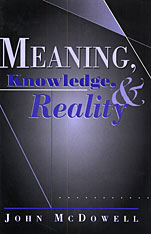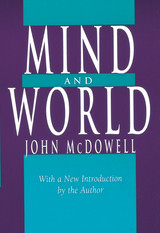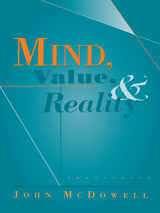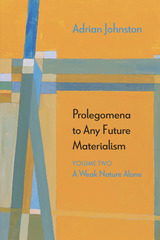

A crucial moment came in the developing split between Anglo-American and continental European philosophers when G. E. Moore and Bertrand Russell rebelled against the “Hegelianism” of their teachers and inaugurated the tradition of “analytic” philosophy. In this new book, John McDowell builds on his much discussed Mind and World—one of the most highly regarded books in contemporary philosophy. McDowell, who has long commanded attention for his fresh approach to issues in contemporary epistemology, philosophy of language, and philosophy of mind, shocked some mainstream analytic philosophers in Mind and World by drawing inspiration not only from analytic philosophers but also from continental philosophers, most notably Hegel.
McDowell argues that the roots of some problems plaguing contemporary philosophy can be found in issues that were first discerned by Kant, and that the best way to get a handle on them is to follow those issues as they are reshaped in the writings of Hegel and Sellars. Having the World in View will be a decisive further step toward healing the divisions in contemporary philosophy, by showing how central methods of the two traditions remain deeply entangled and by revealing how philosophers in both camps might still learn from each other.


Modern philosophy finds it difficult to give a satisfactory picture of the place of minds in the world. In Mind and World, based on the 1991 John Locke Lectures, one of the most distinguished philosophers writing today offers his diagnosis of this difficulty and points to a cure. In doing so, he delivers the most complete and ambitious statement to date of his own views, a statement that no one concerned with the future of philosophy can afford to ignore.
John McDowell amply illustrates a major problem of modern philosophy—the insidious persistence of dualism—in his discussion of empirical thought. Much as we would like to conceive empirical thought as rationally grounded in experience, pitfalls await anyone who tries to articulate this position, and McDowell exposes these traps by exploiting the work of contemporary philosophers from Wilfrid Sellars to Donald Davidson. These difficulties, he contends, reflect an understandable—but surmountable—failure to see how we might integrate what Sellars calls the “logical space of reasons” into the natural world. What underlies this impasse is a conception of nature that has certain attractions for the modern age, a conception that McDowell proposes to put aside, thus circumventing these philosophical difficulties. By returning to a pre-modern conception of nature but retaining the intellectual advance of modernity that has mistakenly been viewed as dislodging it, he makes room for a fully satisfying conception of experience as a rational openness to independent reality. This approach also overcomes other obstacles that impede a generally satisfying understanding of how we are placed in the world.

Modern philosophy finds it difficult to give a satisfactory picture of the place of minds in the world. In Mind and World, based on the 1991 John Locke Lectures, one of the most distinguished philosophers writing today offers his diagnosis of this difficulty and points to a cure. In doing so, he delivers the most complete and ambitious statement to date of his own views, a statement that no one concerned with the future of philosophy can afford to ignore.
John McDowell amply illustrates a major problem of modern philosophy—the insidious persistence of dualism—in his discussion of empirical thought. Much as we would like to conceive empirical thought as rationally grounded in experience, pitfalls await anyone who tries to articulate this position, and McDowell exposes these traps by exploiting the work of contemporary philosophers from Wilfrid Sellars to Donald Davidson. These difficulties, he contends, reflect an understandable—but surmountable—failure to see how we might integrate what Sellars calls the “logical space of reasons” into the natural world. What underlies this impasse is a conception of nature that has certain attractions for the modern age, a conception that McDowell proposes to put aside, thus circumventing these philosophical difficulties. By returning to a pre-modern conception of nature but retaining the intellectual advance of modernity that has mistakenly been viewed as dislodging it, he makes room for a fully satisfying conception of experience as a rational openness to independent reality. This approach also overcomes other obstacles that impede a generally satisfying understanding of how we are placed in the world.


In A Weak Nature Alone, Johnston develops his transcendental materialist account of nature through engaging with and weaving together five main sources of inspiration: Hegelian philosophy, Marxist materialism, Freudian-Lacanian metapsychology, Anglo-American analytic neo-Hegelianism, and evolutionary theory and neurobiology. Johnston argues that these seemingly (but not really) strange bedfellows should be brought together so as to construct a contemporary ontology of nature. Through this ontology, nonnatural human subjects can be seen to arise in an immanent, bottom-up fashion from nature itself.
READERS
Browse our collection.
PUBLISHERS
See BiblioVault's publisher services.
STUDENT SERVICES
Files for college accessibility offices.
UChicago Accessibility Resources
home | accessibility | search | about | contact us
BiblioVault ® 2001 - 2024
The University of Chicago Press









